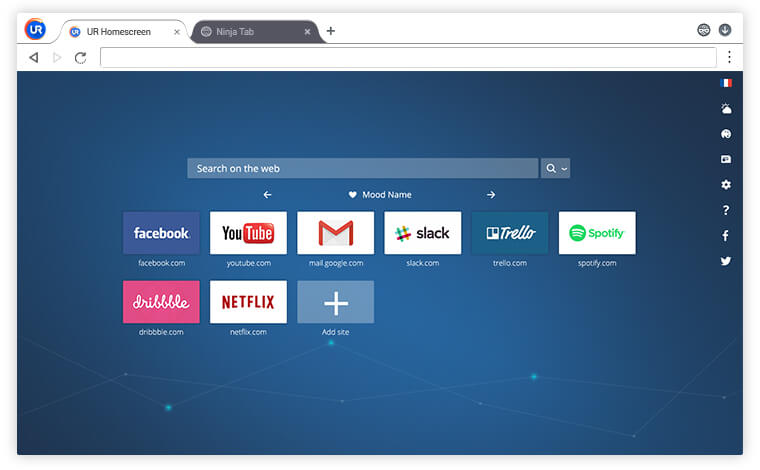Are you searching for a web browser that consumes the least amount of RAM? Well, here are some options for you. These lite browsers are compatible with Windows 11 and offer a seamless browsing experience.
Midori is an open-source browser that offers countless features. It is privacy-focused and uses DuckDuckGo as its default search engine. It also synchronizes data and provides password protection.
Maxthon 6
The Maxthon 6 browser is a full-featured web browser that combines unique features of the popular Maxthon 5 and Chromium, Google’s open source project. It also provides strong technical support and a fast processing speed.
Maxthon features dual rendering engines, displaying pages with either the WebKit or Trident engine depending on the webpage. It offers a variety of unique features, including Magic Fill (saves names and passwords) and SkyNote, which can save text notes across Windows, Mac and Android devices.
This browser is lightweight and easy to use, and offers many options for customization. It’s also a great choice for those who prefer to stay away from plugins and other unnecessary installs.
SlimBrowser
A free software program developed by FlashPeak, SlimBrowser has been making waves internationally because of its speed and features. It claims to download files and videos 10x faster than its counterparts, eliminates obtrusive ads that waste your bandwidth and eye strain and offers secure password management and form filling.
It supports plugins, allowing you to install additional functionality, including ad and pop-up blockers, text translation and a site grouping tool. It also boasts Facebook integration that allows you to share links, pictures and even selected text with a single click. Other features include a photo uploader that optimizes images, weather forecasts and a built-in spell checker. Its interface is more user-friendly than IE but not as streamlined as Chrome.
UR Browser
UR Browser is a secure web browser from AdaptiveBee that provides users with powerful privacy settings. It blocks malicious programs and phishing sites from executing or downloading on the network and also automatically scans downloaded files for viruses.
Unlike other browsers, UR Browser is based in the European Union, where user privacy is highly protected. Moreover, new products displayed on the home screen follow strict content quality guidelines, while newsfeeds are strictly controlled using only reputable agencies like Reuters, BBC, and AFP as sources.
The browser also has a speed dial page and a built-in ad blocker that is customizable. In addition, it has a private mode called Ninja that erases browsing history and searches as soon as you close the tab.
Opera
The Opera web browser has many features that help users to be more productive and efficient. For example, the Turbo mode compresses pages to reduce data usage which is useful for mobile or low-speed internet connections. Other features include a news reader and mouse gestures. The latter allows you to automate your actions with the motion of your mouse.
The browser also includes a crypto wallet, built-in email, ad blocking, thumbnail tab browsing and more. It is also committed to computer accessibility, with a sidebar panel to assist with visual or motor impairments. Other features include a password manager and fraud protection. It can also merge the history of several devices into a single timeline.
SeaMonkey
SeaMonkey is an all-in-one Internet suite, a product of the Mozilla Foundation that contains an advanced web browser, email & newsgroup client and IRC chat as well as HTML editor. Its code base grows from the Mozilla Application Suite and Netscape Communicator.
The application is highly customizable and extensible. It includes features such as popup blocking, data management (including cookies, passwords & permissions) a feed reader & HTML WYSIWYG editor.
It uses the Gecko web engine and is based on other projects by the Mozilla foundation such as Firefox and Thunderbird. It is available for Windows, Linux and Mac OS X. It is also compatible with many of the same add-ons found in Firefox.
Midori
Midori () is an open source web browser that focuses on being lightweight. It was first released in 2007.
Midori supports the ability to use a local proxy server to modify web content before it gets to the browser, which is useful for sites that reject user scripts and user styles. It also supports a range of plugins including Privoxy and Mousehole.
Its focus on speed meant that it gained a sizable niche following and became the default browser in distributions such as Bodhi Linux, SilTaz, and elementary OS. However, development stalled around 2016 and the browser was considered dead until it resumed in 2018. It is now possible to install Midori in the default repositories of many Linux distributions.
K-Meleon
K-Meleon is a lightweight web browser with the goal of best performance. It uses Gecko but without the XUL interface and is better integrated with the Windows desktop. It can even use Internet Explorer bookmarks. It has a simple and classic user interface but some websites may flag it and tell users to use more modern browsers.
This browser is ideal for older computer systems as it doesn’t put a lot of strain on the system resources. It is also fully customizable but requires a learning curve and some knowledge of computer programming. This includes menus, toolbar buttons, themes and macros. It also supports multi-language support. It also has a good popup blocker.
Brave
As a unique browser, Brave takes an innovative approach to ad and tracker blocking. Instead of a pure ads-elimination model, it scrubs sites of their existing advertising and replaces them with its own. It also has a new crypto-currency-based system to compensate website creators with the revenue it generates from its ads.
Its Shields feature offers unparalleled privacy protection by default, blocking ads, fingerprinting, and unauthorized tracking. It also removes bad cookies and enables users to adjust settings on a site-by-site basis for personalized browsing.
Its Chromium-based user interface is simple and familiar, making it easy to use on mobile devices. Syncing between devices lets users pick up where they left off and seamlessly access their bookmarks and history.









